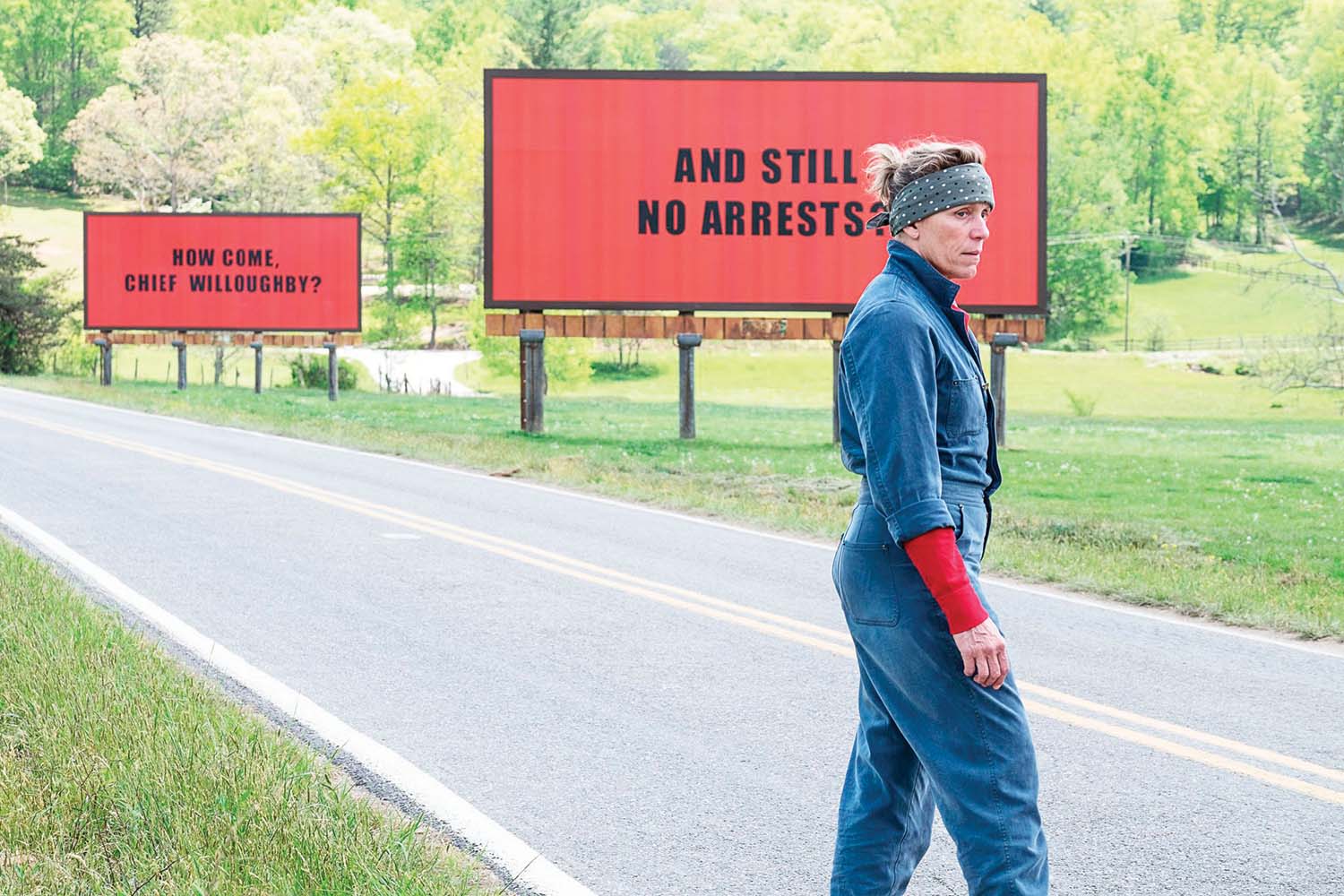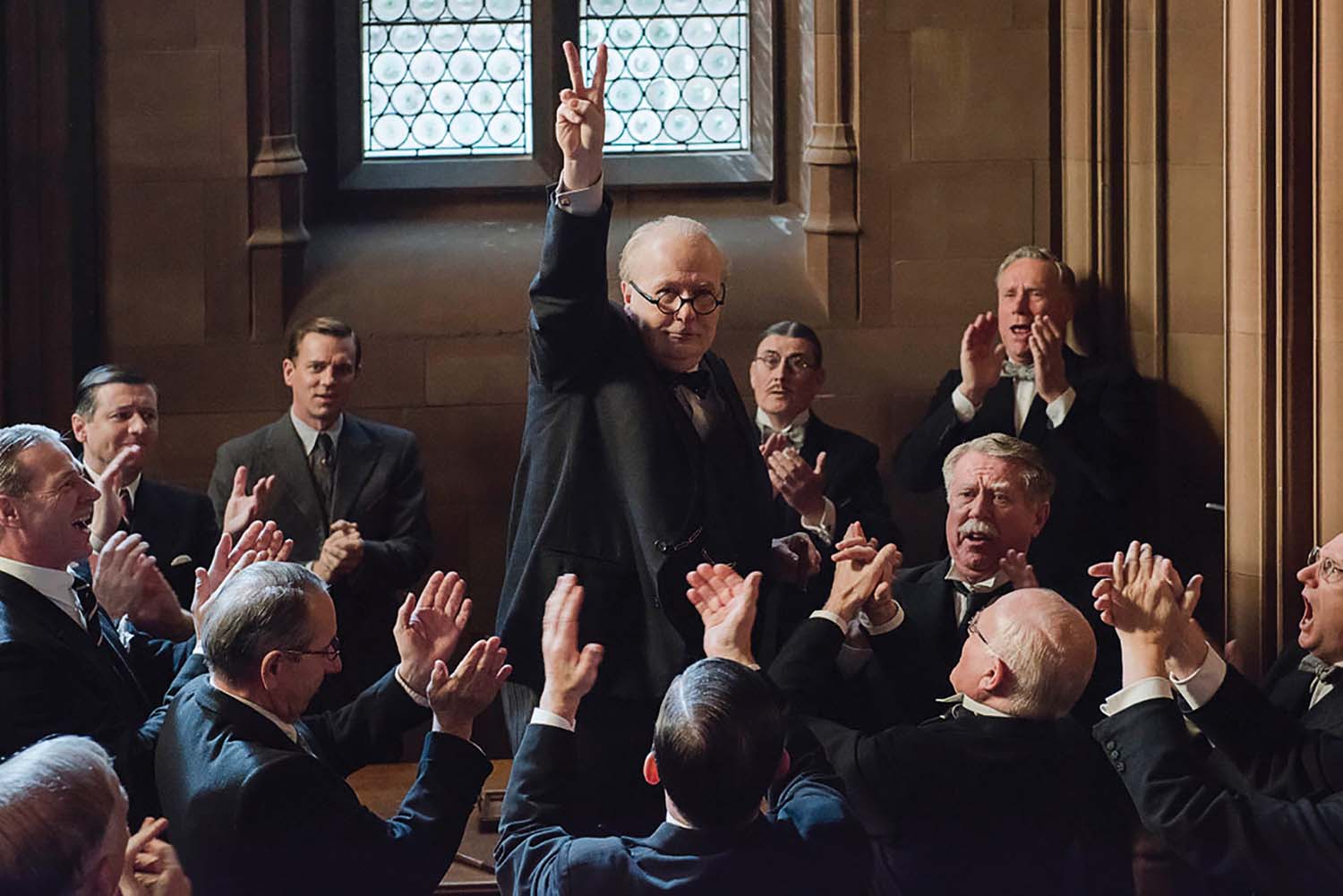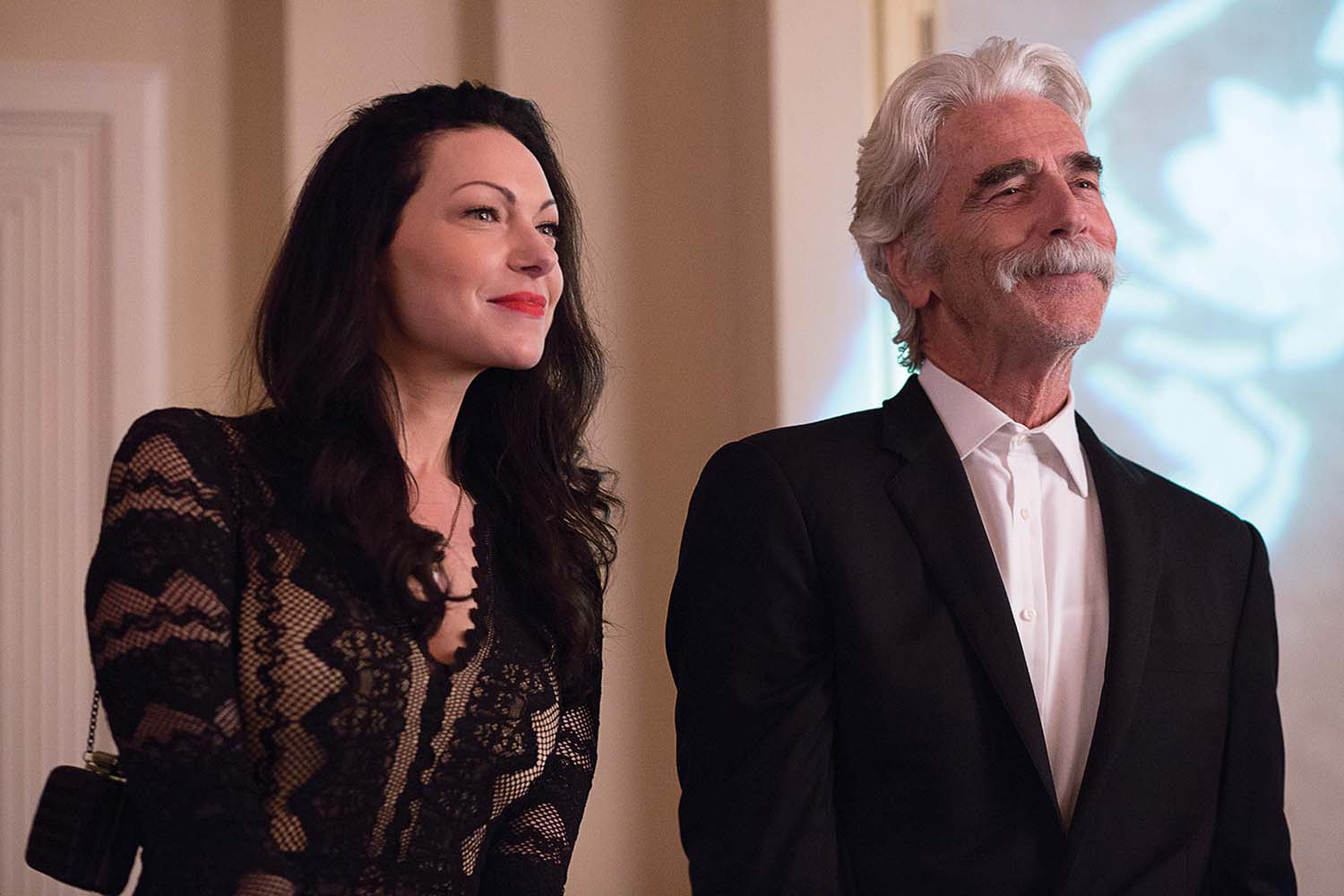
Behind grieving mother Frances McDormand are two of the Three Billboards Outside Ebbing, Missouri. The award-winning crime story was shot in Sylva, in Jackson County, NC. (Photo: Merrick Morton, 20th Century Fox)
Three Billboards Outside Ebbing, Missouri was nominated this year for seven Academy Awards, and won two, for Best Actress Frances McDormand and Best Supporting Actor Sam Rockwell. You’ve heard, no doubt, that it’s violent (true), expletive-ridden (true), and that most of the characters are folks you’d never invite for Sunday dinner (very true).
Confusing, perhaps, is the film’s buzz for being hilarious. The masterful pen of director/writer Martin McDonagh mollifies horrible situations by making them ludicrous, and his unhappy characters speak in venomous, quotable eloquence. It’s not realistic, it’s artistic.
Nor is the movie an accurate portrayal of small-town southern America. There’s not a darn thing particularly southern in the movie — change a few things, and the story could take place in any small town anywhere. Others complain that the movie has no moral compass, that characters do bad things yet go unpunished — not entirely true. Three Billboards’ characters may not get slapped with an earth-based court sentence, but in this complex story, a morality play some call it, life itself metes out justice.
Most distressing are accusations that the movie is racist. Three Billboards is not a racist movie; rather, it portrays two racist people — one is a notoriously bad cop, and the other is his nasty mother. And the characterizations are particularly timely. Asheville’s own recent case involving police brutality — the beating of an African American pedestrian by a white cop, who has since been charged with the crime — is national news.
Most of the townspeople in the movie, black and white, condemn the racist cop. More importantly, society brings about curative action when a new sheriff arrives, an African American, who immediately cleans house.
In a pre-dawn haze, three dilapidated billboards stand like eerie sentinels along a lonely stretch of rural highway. A giant faded baby beams from one board and the words “signs of life” stretch out on another. Ethereal music soars, and, as if the screen is a proscenium curtain, it parts to reveal the title: Three Billboards Outside Ebbing, Missouri. There’s no hint that soon white-hot vengeance will remove all traces of the prologue’s by-gone good times.
Mildred Hayes (Frances McDormand at her square-jawed best) drives past the billboards, then stops, as if seeing them for the first time. Mildred has survived half a lifetime as the punching bag for ex-husband Charlie Hayes (John Hawkes). The abuse left her bitter and angry, ruining the love she tries to give her teenagers — long-suffering Robbie (Lucas Hedges) and short-tempered Angela (Kathryn Newton). When Mildred refuses to loan Angela her car, the girl stomps off, hurling invectives, and Mildred yells matching ugliness after her. That night Angela is raped and burned to death.
That was seven long, soul-sucking months ago. Her daughter’s killer has not yet been arrested, and Mildred can’t take it anymore. The billboards give her a wickedly splendid idea — she will use them to provoke law enforcement to solve the crime.
When Mildred storms into his office, billboard manager Red Welby (Caleb Landry Jones) is reading a classic short-story by Southern Gothic writer Flannery O’Connor. In A Good Man is Hard to Find, a serial killer named “The Misfit” wipes out a family on a road trip. O’Connor, a devout Catholic, believed that violence can cause victims to see reality long enough to allow God’s grace to slip in.
Mildred saves the life of a struggling bug on the office windowsill and makes the arrangements on the billboards. They will go up, fittingly, she agrees, on Easter Sunday, the Day of Resurrection. They will silently scream out her rage: “Raped While Dying”… “And Still No Arrests”… “How Come, Chief Willoughby?”
Chief Willoughby (Woody Harrelson) feels he’s done everything he could to find Angela’s killer, but no matching DNA has turned up. The sheriff, a decent man and a good cop, is also dying from cancer. He takes steps to insure people will feel his presence after he dies, thus tempering the evil in the movie with his goodness from beyond the grave.
Almost everyone in town hates Mildred for making Willoughby’s last days worse, but she won’t back off. In a dark-blue jumpsuit, her hair covered with a bandana, she becomes Rosie the Riveter, dressed for combat. She strides to the thumping strains of a stomp-and-clap march. “Looks like we got a war on our hands,” Willoughby moans.
His prediction haunts the rest of the movie. Officer Dixon (Sam Rockwell), a notorious racist and violent cop, goes on the warpath against Mildred. The battle lines grow more fierce, absurdity escalates, innocents are caught in the crossfire, and like purgatory, the fires of fury blaze until only suffering can put them out.
Filmmaker McDonagh is known for referencing other movies in his own work. For example, Dixon is shown at home with his mother watching a movie on TV. Don’t Look Now (1973) is a haunting tale about a couple in Venice trying to recover from the death of their daughter. The husband is stalked by a stranger, who happens to be a dwarf … prefiguring the Three Billboards character of James, played by Peter Dinklage. Forced together by fate, it seems, Peter helps Mildred — but she, in the movie’s most cringeworthy and inexplicably awful scene, treats him shabbily. Like Don’t Look Now, the color red permeates Three Billboards … the billboards themselves, speeding train cars, splattering blood, and especially, raging fires burning out of control.
There is, however, grace. It’s a fleeting thing, as you may know. In Three Billboards, grace comes in odd ways … a glass of orange juice, an unasked-for alibi, a wild deer eating nearby, and, listen carefully … from the lips of a ditzy teenager, who reminds adults that “anger begets more anger.”
Three Billboards Outside Ebbing, Missouri
Short Take: Controversial black comedy/crime drama, dazzling with brilliant performances and vibrant dialogue.
Director/writer: English/Irish playwright and filmmaker Martin McDonagh (films: In Bruges, 2008; Seven Psychopaths, 2012). His older brother is filmmaker John Michael McDonagh (The Guard, 2011; Calvary, 2012).
Local Interest: Cinematography took place in and around the town of Sylva, in Jackson County, NC. (For a list of all the locations, see visitnc.com.)
Rated R for violence, language throughout, and some sexual references.
Color, 115 minutes.
The film will show in April at Flat Rock Cinema. Check flatrockcinema.com for exact dates, times, and admission. Open Tuesday through Sunday. Closed. 828-697-2463.



